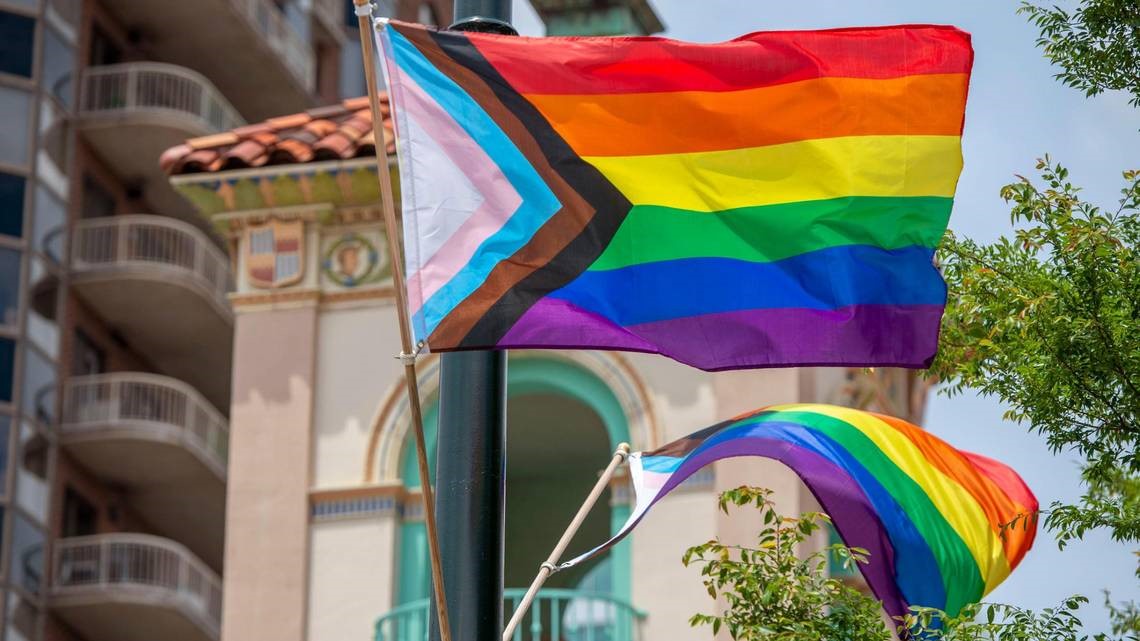My husband and I are the parents of a remarkable transgender woman. She is brilliant, beautiful, and funny. She’s a good friend and sister, and she cares deeply about her community. Transitioning hasn’t been easy, and she has worked hard to become the person she is today. Her journey would have been much harder, however, without the support of people who love her and the professionals who provide her health care.
During the 2024 session, many in the Kansas legislature again spent time and our state’s money to pass new anti-trans legislation. The most dangerous bill, Senate Bill 233, would have denied gender-affirming health care to minors and penalized health care practitioners. Thankfully, the bill did not become law (although it was very close), and Kansas youth can access the care they need for at least another year.
The Kansas bill was not unique. Legislatures across the county are passing similar bans on health care for trans youth. The proponents want you think they were benevolent and caring, saving multitudes of potentially, but probably not really, transgender children from unethical quacks using dangerous procedures.
That is not true. Gender-affirming care saves lives. Research has proven it time and again, which is why EVERY major medical association, including the American Medical Association, the American Academy of Pediatrics, and the American Academy of Child and Adolescent Psychiatry, supports gender-affirming care for transgender youth and opposes health care bans.
"[W]e have an opportunity to learn from one another and value the transgender people in our communities." -Kim Bellemere
When our daughter told us she was transgender, my husband and I were at first shocked, then scared. We didn’t know where to go for help or how to support her. We worried about her safety, we didn’t know what her future would be like, and we were so scared the world wouldn’t treat her fairly.
Despite our fears, it was clear she knew exactly who she was and what she wanted. It became our job to trust and support her. Luckily, we had friends who directed us to the clinics and therapists she needed. Those experts helped us come up with a plan and in doing so, they eased some of our fears.
I refuse to think what could have happened if our daughter didn’t have access to the care she needed as a teen. I can’t imagine the pain and fear she would have had, wondering how to live her life in a body that didn’t feel like hers. I can’t do it and my heart breaks for the parents who will have to face the things I won’t have to, with the passage of similar legislation.
I don’t know why we’re seeing anti-trans bills pushed through legislatures across the country. Government officials inserting themselves into private medical decisions only causes fear and confusion. It also raises doubt about the legitimacy of transgender health care, and even the very existence of transgender people. Or maybe that is the point?
The Kansas bill didn’t become law thanks to the thousands of people who fought against it and the wise legislators who understood the pain it would cause. Now, instead of giving in to fear and misunderstanding, we have an opportunity to learn from one another and value the transgender people in our communities. Over the next year let’s work to build a Kansas where all youth are welcome and can become the people they are meant to be.
-Kim Bellemere
Date
Monday, June 17, 2024 - 2:45pm
Featured image
Show featured image
Hide banner image
Show related content
Tweet Text
[node:title]
Type
Menu parent dynamic listing
Show PDF in viewer on page
Style
Standard with sidebar
Show list numbers
The ACLU of Kansas has worked alongside Kansans to protect our civil rights and civil liberties in every corner of the state.
From LGBTQ+ rights, students’ rights, the rights of those who are incarcerated, freedom of expression rights, every lawsuit or other advocacy effort we undertake is about more than just a single Kansan – the work we do can impact an entire community, our state, or even the country.
This map highlights just some of the ways the ACLU of Kansas has taken action in the past decade - learn more by hovering over each county.
Allen
Open Records Request to Allen County Sheriff
Atchinson
After Aclu Intervention, Atchison Clerk Reverses Decision; Registrations Now Will Be Accepted Up to July 12
Butler
Warden Snyder Re: El Dorado Correctional Facility and Alleged Religious Discrimination
Crawford
To: Girard Usd 248 Re: Hair Length Policy
Douglas
Moore v. Schwab
Marie v. Mosier
Kansas inmates wait in jail for months for mental health treatment. That might change
Ellis
Shaw v. Jones
Hundreds in Ellis County Sign Petition for Polling Location at FHSU
Finney
Garden City CC National Anthem Incident
Ford
LULAC and Rangel-Lopez v. Cox
Coca and Rangel-Lopez v. City of Dodge City
Franklin
Letter to Franklin County Clerk Regarding Federal Form Voter Registrants
Jefferson
McLouth High School re: Denial of Gay-Straight Alliance Club
Johnson
Fish v. Kobach
Gardner Edgerton USD 231 School Board RE: Name, Pronoun, and Facilities Policy
Amicus: State v. Garrett
Leavenworth
To City of Leavenworth re: proposed homelessness ban
Leavenworth County Jail re: Mental Health Access
Hadley Et Al. V. Zmuda Et Al
Lyon
North Lyon County USD 251 Title IX Violations
Marshall
City of Blue Rapids RE 1st Amendment Prosecution
Osage
To Osage County Jail: Violations of Attorney-Client Privilege
Pawnee
Glendening Et Al. V. Howard Et Al. [KDADS – Larned State Hospital]
Pottawatomie
St Marys City Commission Re: Threatened Adverse Actions Against the Pottawatomie Wabaunsee Regional Library
Reno
Letter to Reno County Sheriff's Department Regarding Privileged Mail Policy
Riley
Cole Et Al v. Goossen
Sedgwick
Zanial v. SBEA
Progeny Et Al v. City of Wichita Et Al
Maize Voters Incorrectly Turned Away From Polls; Contact Election Protection Hotline
Shawnee
Brown v. Kobach
Loud Light & Hammet v. Schwab
Letter to UberEats Re: Displayed Name Policy and Risks to Transgender Drivers
Wilson
Ogden v. Figgins
Wyandotte
Alonzo et al. v. Schwab
To Wyandotte Co. Election Commissioner Michael Abbott Re: Language Access
Date
Thursday, June 6, 2024 - 12:00am
Featured image
Show featured image
Hide banner image
Show related content
Tweet Text
[node:title]
Type
Menu parent dynamic listing
Show PDF in viewer on page
Style
Centered single-column (no sidebar)
Show list numbers
Author
Jesse Kielman
Any kind of injustice bothers Faith Martin.
Whether it is a mom yelling at a brother for what a sister did, or someone being harassed by police, or people losing their reproductive rights, she can’t seem to sit still. She says that she has to get involved.
The injustice that has really kept her moving has been helping the formerly incarcerated get their voting rights reinstated. Here, she says, there’s almost too much to do, but the work is not just doable, it’s important.
So, she’s emerged in the Wichita community as a person to whom people can turn with myriad questions, including how to get your voting rights restored.
“When systems break down, people are a part of those systems and they can become collateral damage,” said Martin, the volunteer vice chair of the Wichita Racial Profiling Board. “We need to keep people engaged.”
Here in Kansas, when people are convicted of a felony, they lose their right to vote – this is called felony disenfranchisement. However, many people don’t realize that once they complete their sentence, they can vote.
Right now, there are as many as 30,000 Kansans with past felony convictions who are eligible to vote, but don’t know it.
So, we need a lot of Faiths.
She doesn’t do anything astonishing, she said in her own, self-effacing way. She says she’s good at finding information other people have difficulty finding for themselves and the more she has helped people, the more she’s made a name for herself as a go-to, do-gooder.
Kansas’s partial felony disenfranchisement does more than prevent Kansans from voting during their sentence – even after they become eligible again, it creates confusion, obstacles to voting, and discourages them from persisting even if denied incorrectly. Some community members have reported that when registering to vote with their local election offices after becoming eligible, they were initially denied based on outdated court records.
Martin said people don’t need a ton of paperwork, most of the information isn’t hard to find, and most people don’t realize that much of this can be accomplished in a short moment on a smart phone.
However, people trying to leave the felony and the incident that earned them that felony behind them on their way to a new life, can find adjusting to their new lives frightening or overwhelming. That’s where she often steps in to help.
She says it has become an important outlet for her own need for civic engagement. Sometimes, she said, people think their inability to vote, or their being profiled by police are political issues when they may have more to do with a general lack of civic engagement.
System-impacted people have tons to contribute. They have first-had experience with all sorts of state of issues and thus could offer vital insights into how best to manage our state’s affairs.
Participation strengthens our democracy, and she’s become an advocate for restoring rights after incarceration.
It has become work she enjoys, and, it’s no bother at all.
Date
Monday, June 3, 2024 - 3:45pm
Featured image
Show featured image
Hide banner image
Show related content
Tweet Text
[node:title]
Type
Menu parent dynamic listing
Show PDF in viewer on page
Style
Standard with sidebar
Show list numbers
Pages


